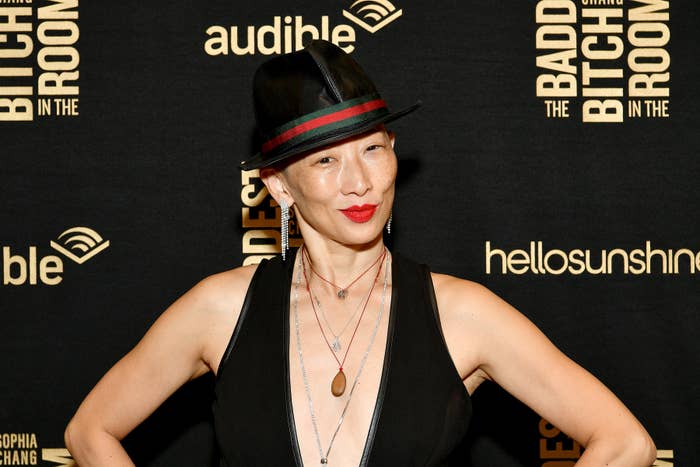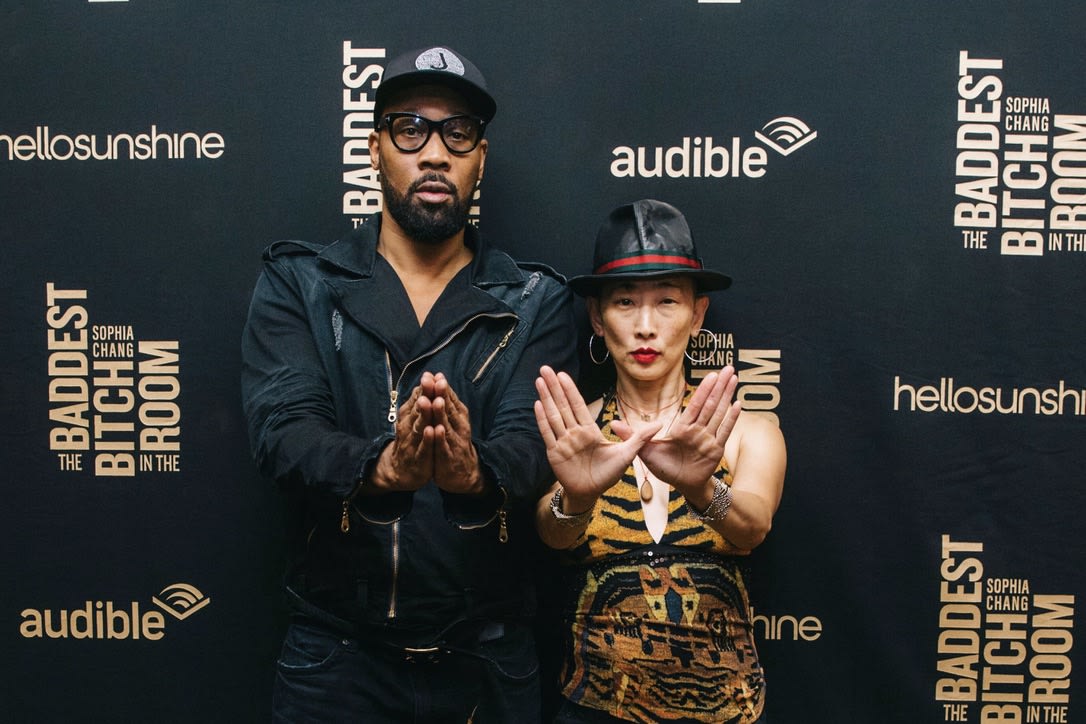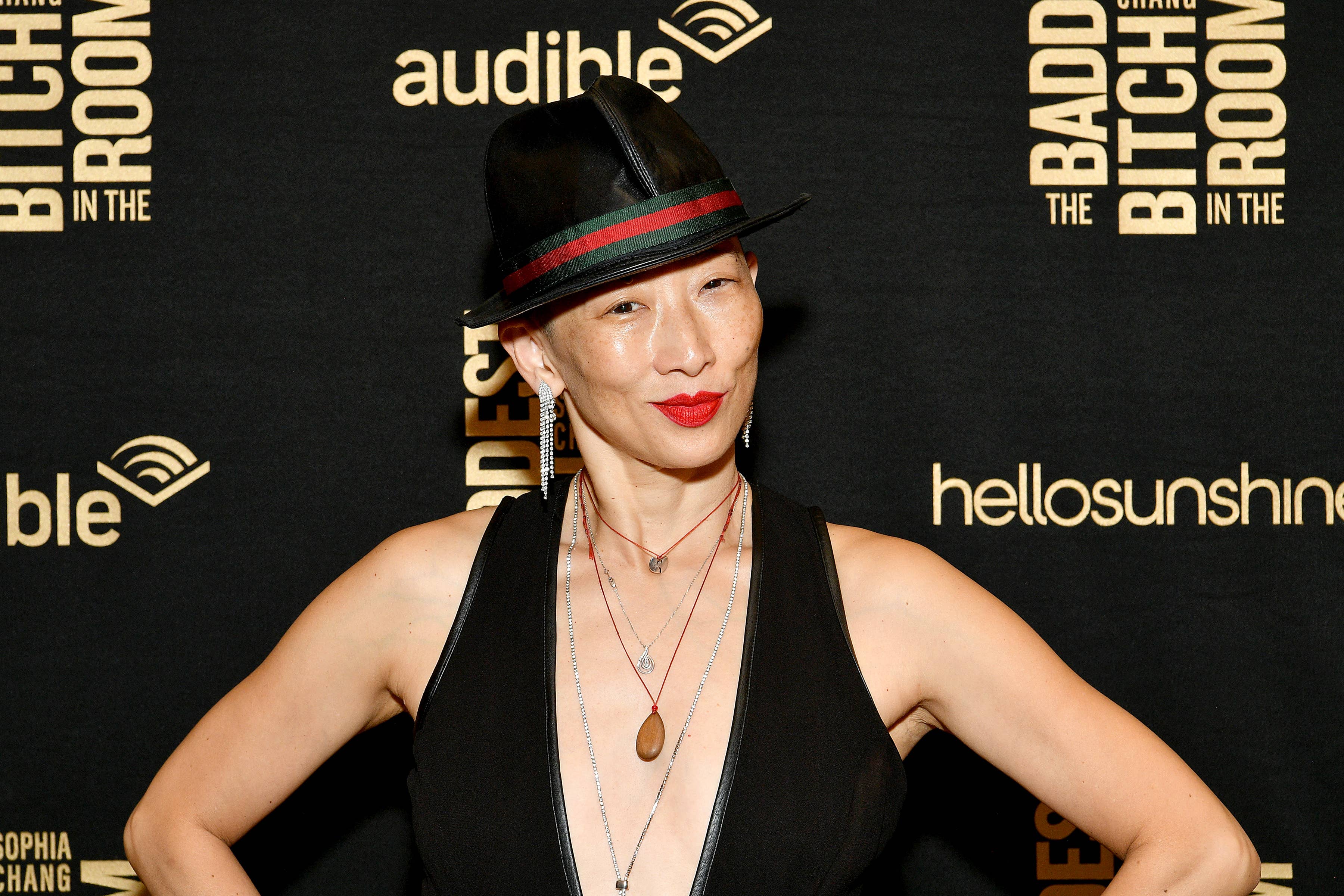
Sophia Chang is the baddest bitch in the room—and has been for decades. Her razor-sharp words, her boundless knowledge, and unimaginable experiences command your attention. As an Asian woman, she has set out to erase every pre-conceived notion people may have about her, from her physicalities, hairstyle choices, and love life, to being a matriarch in the music business recognized as the first Asian woman in hip-hop.
Her everlasting imprint on the music industry would come at the request of the late Wu-Tang member Ol’ Dirty Bastard (ODB), who asked Chang to be his manager. While many believe she managed the collective in its entirety, it was actually the three-letter members—ODB, RZA, and GZA. During our call, she reflects on how the collective was protective of her and other friends, a relationship that would birth the saying “My name is Sophia Chang and I was raised by Wu-Tang.” Her mastery of the industry would also shine through artists like D’Angelo, Raphael Saadiq, and A Tribe Called Quest.
Throughout her personal and professional life as a talent scout, manager and marketer, Chang has aimed to put the treatment of women of color under a microscope, and now she is putting it on the Summer Jam screen for the world to see. To solidify her commitment to elevating other women of color, the Korean-Canadian hip-hop trailblazer and author—she released her written memoire, this year— has launched a mentorship program featuring 100+ mentors from various sectors including the recently announced Joey Bada$$ (see below), RZA, GZA, Danielle Belton, as well as Chang herself. With the help of creative director Michelle Nam, five volunteer video editors, and five volunteer HR representatives, Chang has delved into what it truly means to amplify the voices of women of color with the Unlock Her Potential initiative.
Your program Unlock Her Potential focuses on mentorship for women of color. How did you decide that would be your focus?
My mentor of 33 years, Michael Ostin, was the head of A&R at Warner Brothers and president of Dreamworks Records. We were fast friends and [he] became one of my closest friends through professional and personal triumph. In 2016, I did a lecture at Columbia University and my friend Kysha, a Black woman, stood up and asked how to get a mentor because she's never had one. Daniele Belton [editor-in-chief of The Root] said, “I’m glad Kysha asked that because it’s so hard for Black women to be mentored.” It was what they said to me about what they could have done if they had a mentor and the pitfalls they could have avoided [that inspired Unlock Her Potential].
During this quarantine, I had time to really think about that. The mentors themselves are not all women of color because I think white men need to do that work as well. I think it’s enriching for the mentors too. Not for women of color to be their racial sensitivity coaches and trainers, but [to] listen to what it is like to be a WOC, the pitfalls, and see how they can change it.
How does Unlock Her Potential run?
The program is designed at one hour a month for a year. If a mentee or mentor wants to talk for longer, they can. It’s about managing expectations on the mentors’ part and the mentees’ part, teaching time management, and respecting everybody's time. Until you've ascended to a lot of these people’s level you don't understand how busy someone can be. One hour with any of them could change your life, let alone 12 hours or more.
I’m cracking what an Asian woman can be. I want to force white corporate America to gaze onto this issue. There is a major dearth to this. I don't care if they truly believe. I’m not trying to ingrain this ideological shit, that's not my job. If you can change your prejudices that would be great. I want everyone to have this shift. Just as there is a Diversity and Inclusion and Corporate Social Responsibility department at most major corporations, so should there be one for Mentorship for Women of Color. If they have eight levels, at every single level I want you to tell me what percentage are women of color, publicly. A public awareness program where I dare you to show me the numbers. I'll slap you in the face with my glove and I throw it down. What is the percentage? What is your level of retention?
How has the intersectionality of race and gender impacted you starting out in the music industry and even now?
It was overwhelmingly positive. I was welcomed really early. The scene was so small. Every sector was represented from emcees, DJs, A&Rs, and more. It was very easy to meet people. It was inclusive and inviting.
I’m a woman within hip-hop and I’m Asian. A minority within a minority. I didn’t call myself a feminist until recently. I was afraid of the title. I was afraid I couldn’t live up to it. I was much more aware of racism because I was othered a lot. I wasn't paying attention to the microaggressions of misogyny and patriarchy as much. I was treated differently as an Asian woman.
My relationship with the music I use to rap along to and rap out loud are misogynistic, and now I can’t because I realize they were talking about Black women. They don't sexualize me, objectify me, eroticize me in the same way. That worked for and against me. They looked at me and said what could you possibly know about hip-hop, but I think I have a very singular talent with artists. I think it’s because I’m curious, I’m humble, and I'm grateful for the space they give me. I never saw them as money-making factories. I never worked with anyone I didn’t think was a major talent. They [the artists] told me things they would never tell anyone else in their lives.
I know your network especially in the music industry is wide, but how did you secure your extensive list of mentors? I secured over 100 mentors in about four days, just through text, calls, and emails. We all share the same politics and ethos. It’s me, and they have a personal relationship with me and if it’s me, they know it’s going to run well. They know Soph’s got this and it’ll be good. It was overwhelming to hear all of the yeses. Almost no one said no and it would’ve been for good reason if they did. It’s not original. Mentorship for women of color is not fuckin original, but no one is doing it like me. No one can do it like Sophia Chang. The diversity of talent is all there. I’m proud of myself. What was monstrously true about mentorship and women of color will be changed.
All the mentors aren’t in the music business either. I have mentors in media, professors, developers, agents, publishers, and more. And they’re not all celebrities.
What role have Black women played in your journey?
The pillars of the motherfuckin’ village of Sophia Chang are Black feminists. I think everybody should listen to Black women. They should vote like Black women. Black women should be supported and listened to and not enough people are doing that. Black women fall to the bottom of the totem pole. I feel the love, care and patience they teach. To whatever degree I have the power and access, I’m going to uplift Black women and voices.
You released an audible memoir titled “The Baddest B*tch in the Room” last year. What was the motivation behind the title and you writing a book to share your journey?
It was a very specific night. I was with Beverly Bonds who is the founder of Black Girls Rock and my friends Bethann Hardison, Joan Morgan, [and] Sam Martin at Black Girls Rock. It was an awards show and gala so you know we’re all dressed up and I rushed down to take a picture and I said “No matter what, no matter where, no matter who, me and my girls are the baddest bitches in the room.”
It’s not about going, “I'm a badder bitch than you,” but it is. I claim that. It’s fuckin radical. Fearless and subversive. Instead of the most exotic, most geisha, and whatever other bullshit they say about Asian women. I’m standing on the table and I’m pounding my chest. Shake off the fog of white supremacy, transphobia, homophobia, racism, ageism. The list goes on and on. I want women to sit down and write out the list of things that make you, you. When you read it back to yourself you should say “I’m the baddest bitch in the room.” Not the most pretty, not best body, not the richest, but the baddest bitch.
I host these salons, not like hair salons, but conversations. Salon de Femmes Fatales. Fatale in french is literally “fatal.” So femme fatale is a fatal woman. I feel women are fatal and if given the power we can be incredibly deadly and dangerous. At one of the salons I had them stand up and read their list and it was hard for so many of them, not even because we were in a public space and in front of a lot of people.

Your book serves as an open look at how you broke stereotypes and barriers and rose up as the “Baddest Bitch” in your own eyes first and foremost and then the eyes of many. How does your memoir speak to women of color who experience those same things?
I want women of color to say I read her memoir and she inspired me. To be active, advocate for themselves, be loyal and resilient, to empower and be empowered. I wrote for those who felt they were not seen, valued and were erased. White supremacy and patriarchy are so good at erasing the marginalized. We have to fight to be seen, to be heard and valued. So tell your story, whatever that means. As we tell our stories, I hope in doing so, people listen and we create empathy. I hope that we are humanized. I think if people saw each other human to human we would see the atrocities. We wouldn't see Black women die in childbirth 3 to 4 times more than white women. We wouldn’t see Black trans women killed 7 times as much as the general population and be misgendered all the time. That is trans misogynoir.
Being a woman and force in hip-hop, how do you feel about how women are dominating right now?
I’ve aged out of hip-hop. I’m aware the female emcees are becoming this phenomenon and I’m so damn happy about it. We went into this period where we were plunged into this darkness and now we have this resurgence. These women have so much agency. This is a whole new era. The digital era is much different. They’re much more engaged, more business savvy, more entrepreneurial.
I really like this incarnation. Women owning their sexuality. Sex workers are in this world that’s amazing and it’s through their own lens, then fuck yeah. I love how independent they feel. I don’t know Cardi B. records, but I fuckin love Cardi. She’s so quintessentially New York. When Nicki was on stage and said “Whats good Miley,” I was like fuck yes. It’s so New York. I like Cardi, Nicki, and Megan Thee Stallion. Even if I listen and it doesn't resonate with me, I still love it because it’s about agency, power, and independence. Strip clubs are a testing ground and records get broken in strip clubs. It’s a three-level benefit. There were all these women who empowered women and rapped about their agency—Lil Kim, Salt-N-Pepa, Queen Latifah. Queen Latifah created this sense of unity and female empowerment with “Ladies First” and “U.N.I.T.Y.” and it’s happening again.
It’s clear that with the development of her mentorship program and memoir, Chang hopes to emit the same female empowerment she witnessed Queen Latifah create. So here’s to more bad bitch bitches stepping into the room and staying there.
Unlock Her Potential is now live and accepting applications for mentees, who must be 18 and older and a woman of color. The application window will remain open until October 5, 2020, at 11:59 pm. Additionally, physical copies of Sophia Chang’s memoir “The Baddest Bitch In The Room” are now available.
